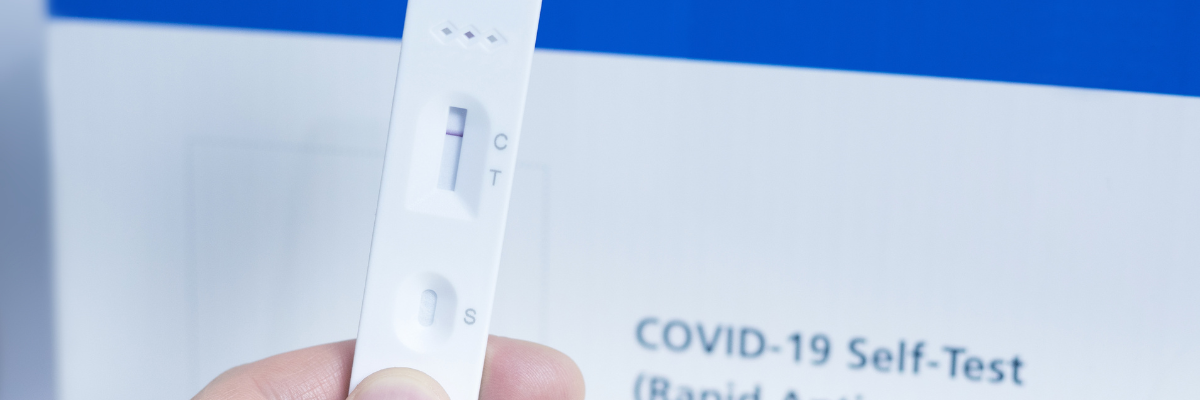Almost three years on from the start of the pandemic, we’d all like to forget about COVID-19 this year, let’s be honest. But with one in 20 people currently testing positive for it as we start 2023, that’s still not going to be possible. What’s more, with a new variant on experts’ radar, it looks as though this highly contagious and disruptive virus is going nowhere this year, other than around households, classrooms, offices and hospitals.
ZoomDoc’s Chief Medical Officer says calls about COVID kept his team of doctors pretty busy over the festive season:
‘We received many calls over the festive season from people feeling floored by the virus,’ says Chief Medical Officer, Dr Kenny Livingstone.
‘As we enter our fourth year of living with COVID, being aware of the symptoms and following the same basic rules such as handwashing and keeping away from vulnerable people if you have it will help us limit the spread and carry on as normally as we can this year.’
So, from the latest figures to new strains circulating, here’s everything you need to know about COVID in 2023.
Is COVID still around?
Very much so.
According to latest figures from the Office of National Statistics (ONS), 3 million people tested positive for the virus at the end of December (2022), with 1 in 20 likely to have had it over Christmas in England (increasing to 1 in 18 people in Wales and 1 in 16 people in Northern Ireland).
This latest spike in positive cases is the largest since last summer. Primary school-age children and people over 50 are the most-affected age groups.
Is a new variant to blame?
It’s thought that the increase in cases was linked to an increase in indoor socialising over the festive season than a new variant.

A number of variants are now circulating in England, several of which have acquired mutations that may result in immunological escape.
The latest variant to be under surveillance is called XBB 1.5 – a highly infectious sub-variant of the globally-dominant Omicron strain. Scientists aren’t too worried about this variant as so many of us in the UK have some protection from vaccines and previous infections.
What are the current symptoms of COVID?
According to the NHS, the official symptoms of COVID-19 are similar to colds and flu and can include:
- a high temperature or shivering (chills) – a high temperature means you feel hot to touch on your chest or back (you do not need to measure your temperature)
- a new, continuous cough – this means coughing a lot for more than an hour, or 3 or more coughing episodes in 24 hours
- a loss or change to your sense of smell or taste
- shortness of breath
- feeling tired or exhausted
- an aching body
- a headache
- a sore throat
- a blocked or runny nose
- loss of appetite
- diarrhoea
- feeling sick or being sick

If your symptoms continue, our ZoomDoc experts can walk you through what is normal and what to expect as you improve.
However, the most common symptoms are tracked by the ZOE Health Study, set up by epidemiologist, Professor Tim Spector in 2020.
ZOE’s findings suggest that the 10 most common symptoms to be aware of (as of December 2022) are:
- a sore throat
- a runny nose
- a blocked nose
- sneezing
- a cough without phlegm
- a headache
- a cough with phlegm
- a hoarse voice
- muscle aches and pains
- an altered sense of smell
What should I do if I have COVID?
If you think you have COVID it’s worth doing a lateral flow test to confirm. Although they’re no longer free for most people, they’re now widely available in pharmacies and online for £11 here at ZoomDoc.
Although there’s no official requirement to isolate anymore, the NHS recommends ‘staying at home and avoiding contact with others for five days after testing positive.’ You should also try to avoid vulnerable people for 10 days.
‘If you’re feeling particularly unwell and get worse rather than better, or are concerned about your health, don’t hesitate to seek medical help. ZoomDoc can put you in touch with a GP via video or phone call the same day for just £35,’ says Dr Kenny. Find out more, here.
How can I avoid getting COVID?
By now most of us will have COVID at least once and given how infectious it is, it can prove hard to avoid, particularly once cases spike in your area or community.

Hand-washing with soap and water for at least 20 sec is the first line of defence in stopping the spread of infection
The best advice for avoiding it is to:
- wash your hands regularly and thoroughly with soap and water for 20 seconds (sing Happy Birthday twice) or use hand sanitiser when you’re on the go
- keep windows open and fresh air circulating in homes where someone has the virus
- try to avoid close contact with anyone known to have COVID
Can I still get a COVID vaccine?
Since the COVID vaccine was first rolled out in December 2020, most of us will have had two doses and a booster ahead of the December 2021 Omicron outbreak. Last winter (2022) a further seasonal booster (tweaked to target two strains at the same time) was given to pregnant women, over 50s and priority groups such as healthcare workers.
If you’re eligible for a seasonable booster or haven’t had any jabs at all you can book yours for free via the NHS here.
‘COVID vaccines played a valuable and life-saving part in our bid to get out of lockdowns and back to normal. Without them there would have been significantly more deaths and severe illness from COVID, which now tends to be flu-like, but manageable for most people.
‘It’s not too late to have the vaccine if you didn’t already have it – I’d recommend anyone who’s unvaccinated to book an appointment as it’s your (and our) best defence against current and future strains,’ says Dr Kenny.
Read more about the COVID vaccine here




